I have been working on an XP based grading system since long before I became a teacher. As a student I hated the uncertainty of not knowing my exact grade and even most teachers couldn't tell me until the end of the semester. I also had a hard time motivating myself to study, because of this uncertainty. I always thought "nah.. it's too late anyways... I'm sure I'm failing no matter what I do"
I worked hard on something I called "Grading 2.0" back in around 2007. I even wrote my diploma thesis on the subject of learning and grading in the digital age.
The Problem: Grading sucks for students (also a bit for us teachers)
Grading is much more complex than I initially thought. There are so many factors that may or may not find their way in a grade but the student's never see them in a form that they could put in context of their own performance.
For us teachers it's hard to pin point how little a student has to do to be failing or how much they have to do to get the best grade. Every teacher has their own system but almost all of them are not transparent when you're in the middle of a semester. Grading is definitely one of the hardest thing for a (new) teacher.
So what doesn't suck for students?
Games don't suck. Popular games like World of Warcraft are easy to learn, hard to master and straightforward:
- Someone gives you a Quest that matches your skill level and they tell you what you'll get if you finish it
- You have to work (hard) to achieve the goal
- You return and collect your reward and Experience Points (XP)
In contrast here is how it works in schools:
- The teacher gives you an assignment
- You do it and hand it in
- You might get a + if you did it well and a - if you didn't. This adds to your grade somehow
You see the system is quite similar but differs at a key point:
In games you always can put your reward into context and see the big picture.
The game will tell you exactly how many XP you'll need to "level up". This is what I wanted for our schools.
XP based grading
The system I'll be describing next has been reviewed by members of the ministry of education in Vienna and by a person involved in the creation of the Austrian LBVO which describes in great detail how a teacher has to grade their students.
The basic principle of the XP based grading system:
- In the beginning of a year the teacher defines sections and assigns them an XP limit
- The students receive XP for every positive action/participation
- XP can't be lost or taken away (this is especially important for motivational reasons)
- If a student has more than 100% XP in a section, they can put these "overflow XP" into another section
I have created an e-Learning platform called "Socialcube" which is my "proof-of-concept" for the XP based grading system and I'll use this platform to show you how the grading system works.
"If I saw that I only needed a few more XP to pass I would be much more motivated to study than if I didn't have this context"
-Student Marcel Fuschlberger, 2012
1. Create "Grading Sections" and give them an XP-cap
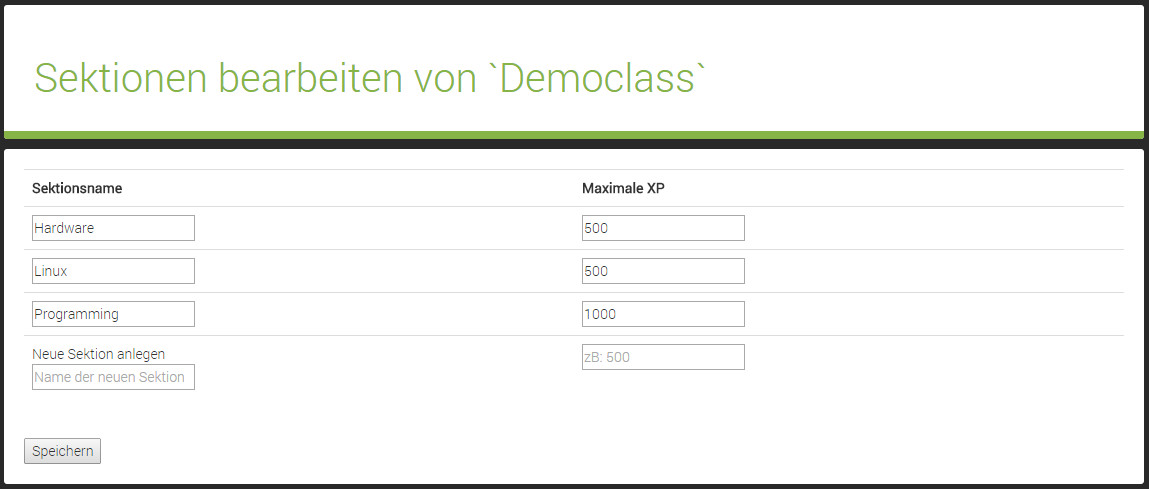
- Hardware with a maximum of 500 XP
- Linux with a maximum of 500 XP
- Programming with a maximum of 1000 XP
2. Start giving out XP
For every XP you give them you have to provide a reason why they got it. This is very important, because the students (and also the teachers) can recap what they did and what they earned the XP for.
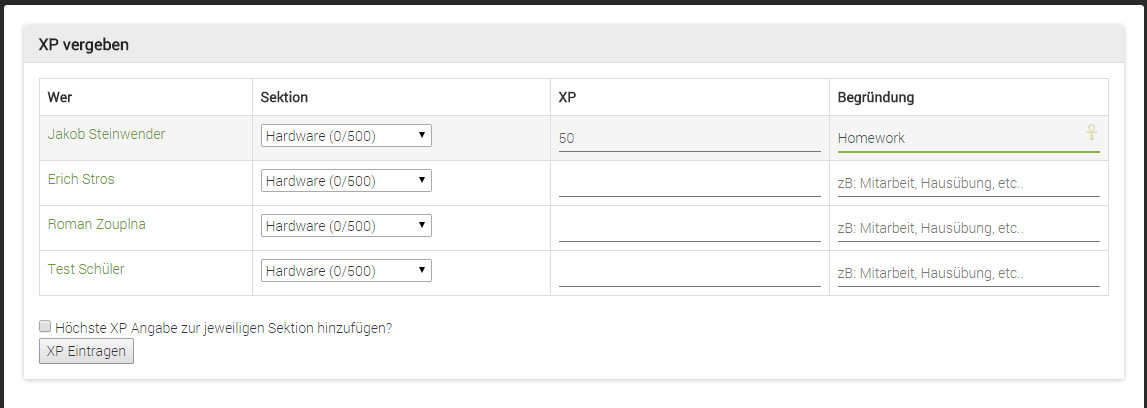
Start giving them XP for every positive interaction!
- They are attending (or bring a note from their doctor for missing last time)? +5 XP
- They raise their hands and say something productive? +5 XP
- They are doing a presentation? +20 XP
- They did their homework somewhat good? +15 XP
- They did their homework extraordinary good? +35 XP
You get the idea..
What the student sees
The student gets a notification for every XP they get and they are presented with a few graphs about their performance and how it relates to the whole grade, the grade in the section and in comparison to the other students in this class. They also see an XP-log with the date, reason and amount for the XP they got.
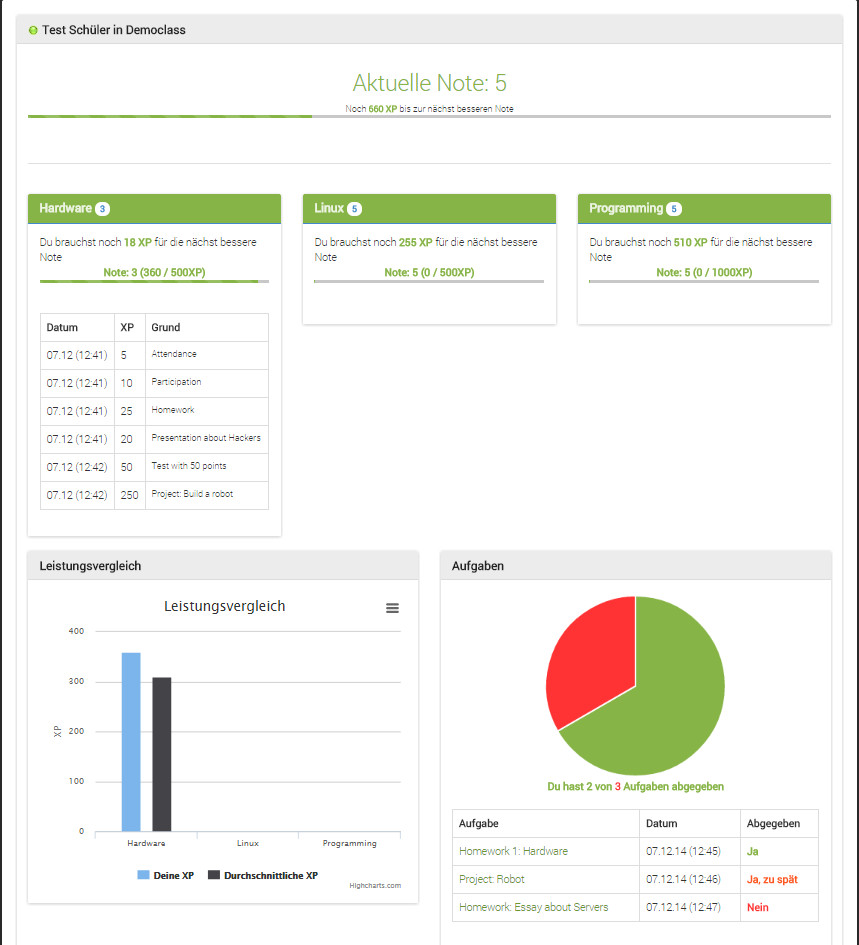
This student sees clearly he/she needs only 18 more XP to get the next higher grade. The "overall grade" only changes when all sections are positive (at least the grade 4).
This is what the XP based grading system is all about!
Question: "But I don't know how many XP a grading section will have because I don't know yet how long I'll work with the students on this topic. Do I have to change it all the time?"
Answer: "No, there is an easier way"
I got this question a lot in the last years and I developed a solution for it:
Flowing with the section
A teacher can choose to set a section to a maximum of 0 XP like so:
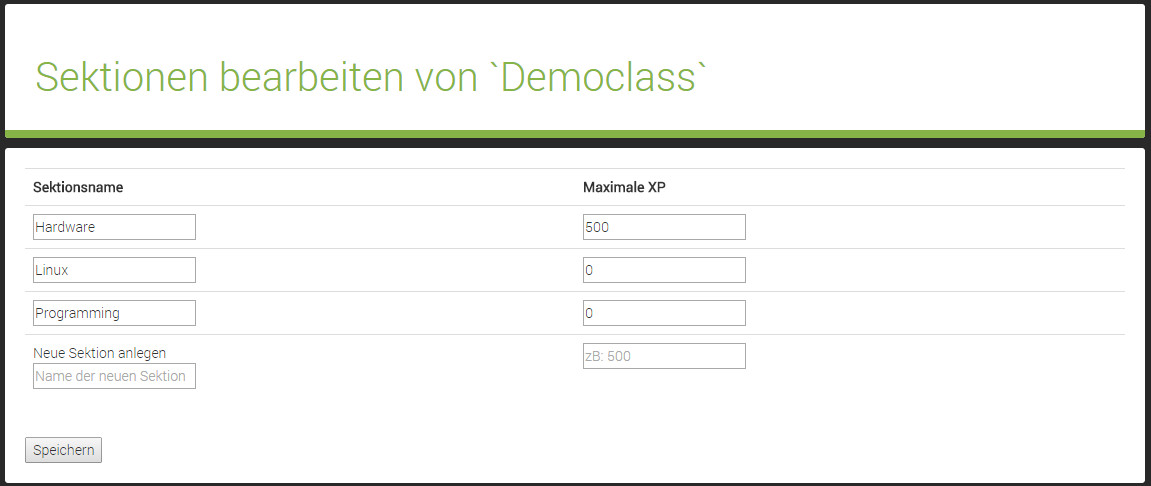
And then can choose to raise the sections max-XP every time they give students XP
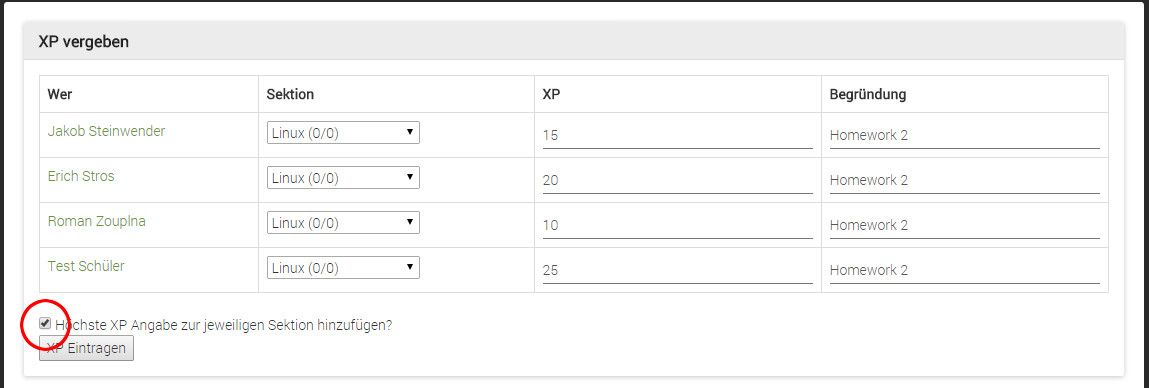
See that little checkbox in the lower left corner on the image? It tells the system to add the highest value of XP that you just entered to the sections maximum XP.
Pro and Con of this method:
- Pro
- It's much easier to handle for a teacher
- It raises "the bar" fair for everyone to see
- Con
- Students start out with the best mark (1) and might get lazy and then see their grades drop
- Positive grades can change back to negative grades and this eliminates the motivational aspect of "earning something that can't be taken away"
What I've learned after 3 Years of using this System
1. Once Students have positive grades they work even harder
One of my fears was that if a student's grade turns positive in the middle of the semester, that he/she might stop participating because "they're safe". Amazingly the opposite was the case: These students were more active, did all homework assignments and even helped others. This might be because of something I call the "high level syndrome". They feel much more confident because they're safe from failing.
2. Students love the transparency
Every year when I get my new classes I tell them about the grading system and I can always see their eyes getting bigger and laughing and sometimes applauding because they're so excited about this system. I get asked every year why not all teachers use this method and that they would love having this data for other classes.
3. The young teachers are very interested in this grading system, some older teachers fear the downsides
My System is not ready for prime-time yet but I told many teachers about it and most of them were very excited. But there are of course also concerns:
"So you mean I have to take a laptop to every class and have to enter XP while teaching? That takes too much time. Also what if the internet fails? I would have to write it on a paper and have to enter all the data from home in my spare time?"
Anonymous Teacher
I think the XP based grading system is not for every teacher the right choice and that's okay! Many teachers don't even own computers and it would be too much to ask to "make them to learn" how they work, just so they can use this grading system. The systems needs to be adapted by teachers who're familiar with technology and have a sense of excitement for this project. I wouldn't want to force anyone to use this because some teachers are better off with their current system.

Comment using SSH! Info

